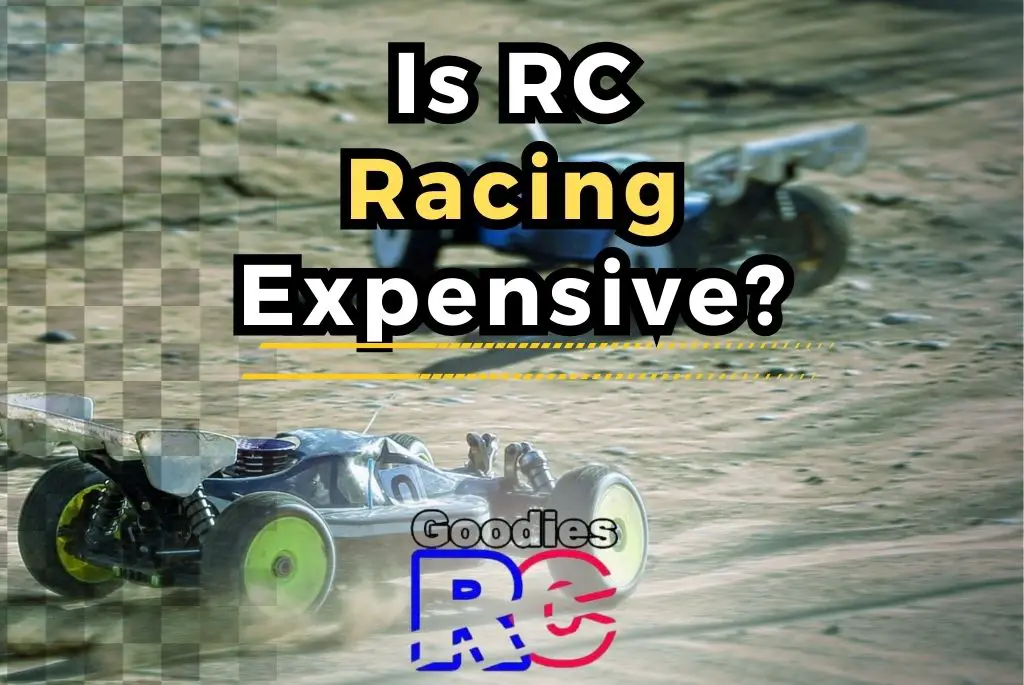RC racing is so fun as a hobby or sport competing with other racers, but how much does RC racing cost?
RC Racing is expensive in the higher ranks, but it’s affordable starting out. From lower to higher ranks, a nitro car costs anywhere from $600 to $1500 and electric from $200 to $1300. Ongoing expenses could be $15 to $50 per race day and maintenance costs are around $100 to $250 per month.

RC racing is an exciting hobby, but understanding the costs is key. Let’s break down the expenses for two popular setups: 1/8th scale off-road nitro and electric. Plus, we’ve got some expert tips to help you make the most of your budget.
Disclaimer: The cost of cars and parts vary widely depending on several factors, so these are just rough estimates to give you an idea of the costs.
1/8th Scale Off-Road Nitro Setup
Car Kit ($499)
Consider kits from reputable brands with good customer support. Look for a model that allows easy access to components for maintenance.
Transmitter & Receiver ($40)
While a basic system works for beginners, investing in a quality transmitter can improve control and response time as you advance.
Starter Box Battery ($20)
Choose a reliable battery and keep it charged. Consider having a spare if you plan for a long race day.
Nitro Starter Kit ($20)
Purchase a reliable starter kit, and learn proper engine-starting techniques to avoid unnecessary wear.
Glow Plug x3 ($30)
Invest in reputable glow plugs. Store them in a cool, dry place, and replace them before they fail to avoid race-day disappointments.
Wheels & Tires ($40)
Experiment with different tire compounds based on track conditions. Learn to glue tires properly to prevent them from coming off during races.
Fuel ($40)
Stick to high-quality fuel to ensure engine performance. Store fuel in a cool, dry place and use a fuel filter to keep the engine clean.
Speaking of nitro RC cars, do you know how fast a nitro RC car can go? Read the article to learn more.
Paint ($10)
Start with simple designs. Protect your body by applying a clear coat or using protective film.
Engine & Pipe ($190)
Invest in an engine with a reliable track record. Regular maintenance, like cleaning the air filter, can extend its life.
Servos ($200)
Opt for servos known for durability and quick response. Regularly check and adjust servo horn tightness to prevent issues.
Flywheel & Clutch Kit ($20)
Regularly inspect and clean clutch components. Learn basic tuning to optimize clutch engagement for your driving style.
Starter Box ($60)
A durable starter box is a good investment. Regularly check the starter box battery’s charge level to avoid race-day surprises.
Receiver Battery Pack ($15)
Choose a reliable battery pack with sufficient capacity. Always have a spare to avoid interruptions during races.
Nitro Ongoing Costs
For nitro RC racing, ongoing costs involve race fees of approximately $15 per club-level race day. Monthly maintenance, subject to a 10% increase, includes replacement parts estimated at $240 to $600 annually. These parts cover wear and tear on components like drive shafts, suspension arms, and clutch shoes. Consumables, estimated at $360 to $600 yearly, encompass tires, glow plugs, and nitro fuel.
1/8th Scale Off-Road Electric Setup
Car Kit ($499)
Look for kits with parts readily available. Consider models with adjustable settings to fine-tune your car’s performance. Speaking of the cost, you might also want to learn about the cost of RC trucks.
Motor ($50)
Start with an entry-level motor and upgrade as your skills improve. Regularly clean and inspect the motor for optimal performance. Check out this guide on how to clean and maintain a brushed RC motor for further information.
Speed Controller ($99)
Opt for a waterproof speed controller to protect against track conditions. Keep it clean and cool for consistent performance.
Batteries x2 sets ($160)
Rotate battery sets to extend their life. Consider a LiPo-safe bag for storage and charging.
LiPo Charger ($40)
Invest in a reliable charger with safety features. Charge batteries in a safe area and avoid overcharging.
Servo ($100)
Balance torque and speed for your driving style. Regularly check for loose connections and keep the servo well-maintained. Speaking of servo, I highly recommend reading this guide on how to choose the Servo of an RC car. It will help you to get lots of insights on RC servo.
Transmitter & Receiver ($40)
As you progress, consider investing in a mid-range transmitter for more features and customization options.
Wheels & Tires ($40)
Experiment with different tire compounds and learn proper gluing techniques to optimize traction on different tracks.
Mod 1 Pinion Gear ($15)
Regularly inspect and clean gears for optimal performance. Experiment with different gear ratios to find your preferred setup.
Paint ($10)
Keep your designs simple at first. Protect the body with a clear coat or protective film.
Ongoing Costs
In electric RC racing, the monthly costs also include race fees of around $15 per race day. Monthly maintenance, with a 10% increase, covers replacement parts ranging from $240 to $600 yearly. This includes components such as drive shafts, suspension arms, and clutch shoes. Consumables, estimated at $360 to $600 annually, comprise tires, pinion gears, and LiPo batteries essential for electric-powered setups.
LiPo Chargers
Invest in quality for safety. Consider chargers with storage modes to prolong battery life.
Wheels and Tires
Buying separate components gives you customization options. Experiment to find the best setup for your driving style.
Brushless Motors
Upgrade as you progress. Look for motors with adjustable timing for fine-tuning. By the way, do you know what’s the exact difference between brushed and brushless motors? Check out the guide to learn more.
LiPo Batteries
Stick to your car’s cell count limit. Check dimensions to ensure a proper fit in your car’s battery tray.
Common Replacement Parts
Stock up on common parts. Regularly check and replace worn components to avoid race-day breakdowns.
ESC (Electronic Speed Controller)
Upgrade to higher amperage as needed. Waterproof models are great for all-weather racing.
Pinion Gears & Clutch Bells
Start with common sizes. Experiment with different gear ratios for improved acceleration or top speed.
Servo
Regular maintenance is key. Keep an eye on torque and speed for optimal performance.
Travel and Accommodation
Plan ahead to save on travel and stay costs. Consider sharing accommodations with fellow racers.
Monthly Costs
Race Fees (Club Level): $15 per race day
If racing once a week: $60 (approx.)
Maintenance:
Replacement Parts: Varies, estimate $20 – $50 per month depending on usage.
Consumables (tires, glow plugs, fuel): Varies, estimate $30 – $50 per month.
Total Estimated Monthly Cost: $110 – $160
Yearly Costs
Race Fees (Club Level): $15 per race day
If racing once a week for a year: $780 (approx.)
Maintenance:
Replacement Parts: Varies, estimate $240 – $600 per year depending on usage.
Consumables (tires, glow plugs, fuel): Varies, estimate $360 – $600 per year.
Total Estimated Yearly Cost: $1,380 – $1,980
Keep in mind that these are rough estimates, and actual costs will vary based on your racing habits, participation in regional or national events, travel expenses, and specific maintenance needs.
Additionally, the initial setup cost, which includes the purchase of the RC car and necessary equipment, is not included in these monthly and yearly estimations.
What’s next? If you really want to dig deeper into RC racing, check out this guide about making career from racing RC cars.
